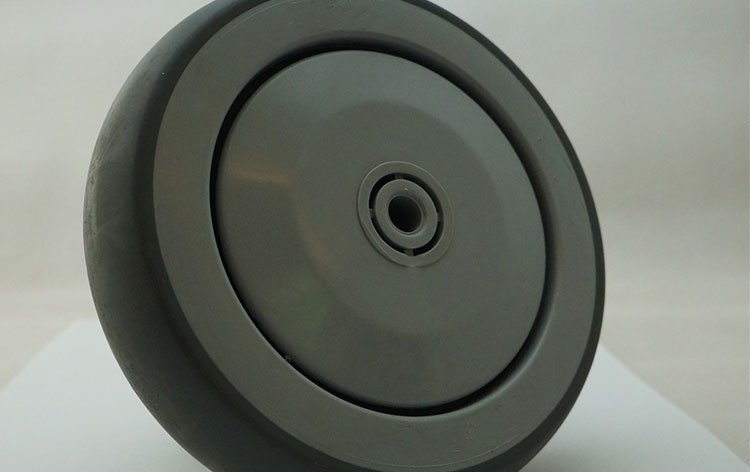Back
Share
TPE Compounds for Medical Casters with Anti-Static Properties and Reduced Noise Operation
TPE compounds are increasingly used in the medical industry for a variety of applications, including casters for medical equipment. TPEs offer several advantages over traditional materials such as rubber or PVC, including superior strength, durability, and resistance to chemicals, UV radiation, and microbial growth.
When it comes to medical casters, TPE compounds are often chosen for their ability to be customized to meet specific requirements, including anti-static properties. Medical environments must be kept clean and free of contaminants, and the build-up of static electricity can attract dust and other particles that can compromise the sterility of the environment. Antistatic TPEs can help reduce the risk of this happening, making them an excellent choice for medical casters.
TPEs can be formulated with a range of surface resistances, depending on the application. TPEs can be processed using a range of methods, including injection molding, extrusion, and blow molding, making them a versatile material for a wide range of medical caster applications.
In addition to their antistatic properties, TPEs can also be formulated to be resistant to various chemicals, making them ideal for use in medical environments where harsh disinfectants and other chemicals are used regularly. TPEs are also non-toxic and can be formulated to be compliant with various medical standards, including USP Class VI and ISO 10993-5 for biocompatibility.
Overall, TPE compounds are an excellent choice for medical caster applications due to their strength, durability, chemical resistance, and ability to be customized to meet specific requirements, including antistatic properties.

Key Benefits of TPE Compounds for Medical Casters
TPE compounds have a wide range of applications in various industries, including those listed below:
-
Medical equipment: TPEs are widely used in the manufacturing of medical equipment, including surgical instruments, medical tubing, and patient monitoring devices, due to their biocompatibility, resistance to chemicals, and ease of sterilization.
-
Hospital equipment: TPEs are used in the manufacturing of various hospital equipment, including bed rails, medical carts, and patient lifts, due to their excellent resistance to chemicals and UV radiation, and their ability to withstand repeated cleaning and disinfection.
-
Food service: TPEs are commonly used in food service equipment, including kitchen utensils, cutting boards, and food containers, due to their durability, resistance to chemicals, and ease of cleaning.
-
Institutional equipment: TPEs are used in a variety of institutional equipment, including office furniture, school furniture, and institutional carts, due to their strength, durability, and resistance to wear and tear.
-
Case carts: TPEs are used in the manufacturing of case carts used in hospitals, medical facilities, and laboratories. The material's excellent chemical resistance, low-temperature flexibility, and durability make it an ideal choice for these applications.
-
Store fixtures: TPEs are used in the manufacture of store fixtures such as shelving, display cases, and signage due to their ability to be molded into various shapes and colors, making them an excellent choice for custom applications.
-
Utility carts: TPEs are used in the manufacturing of utility carts used in various industries, including healthcare, hospitality, and retail. The material's flexibility, durability, and resistance to chemicals make it an excellent choice for these applications.
Everlon Recommendation: TC-665N(H)
Everlon TPE compounds are an exceptional choice for a wide range of applications due to their numerous desirable features, one of that is crystal clear grade TPE: TC-665N(H), which has features include:
-
A wide range of hardness levels, including the popular Shore 65A hardness used in medical caster applications.
-
Easy incorporation of antistatic agents to enhance performance.
-
An anti-slip surface, particularly useful in applications where slip resistance is crucial, such as medical equipment and kitchen utensils.
-
High scratch-resistance, essential for applications where surface damage is a concern.
-
Non-stick properties, making them ideal for applications that require a non-adhesive surface.
-
Ease of processing and coloring through various methods, including injection molding, extrusion, and blow molding.
-
Excellent elongation and elasticity, making them suitable for applications where flexibility and durability are essential.
-
Excellent tensile strength, ideal for applications that require high strength and durability.
-
High resistance to weather and heat, with some formulations capable of withstanding temperatures up to 100℃.
-
Very good resilience, ideal for applications that require repeated flexing or bending.
-
Compliance with Reach & Rohs requirements, ensuring that they meet regulatory standards in various industries.
-
Good floor preservation properties.
-
Excellent shock-absorbing characteristics.
-
Reduced noise operation, making them a popular choice in noise-sensitive applications.





